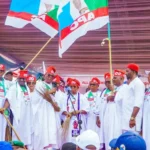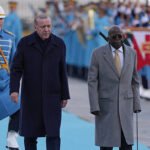By Alister Bull/Bloomberg
Central Bank of Nigeria Governor Olayemi Cardoso said the naira’s recent sharp rise is a positive verdict on policy action to curb inflation, not because the authorities have been intervening in its support.
“It is not our intention to defend the naira,” he said on Wednesday during an event at the spring meetings of the International Monetary Fund and World Bank in Washington. “The shifts you’ve seen in our reserves has really little or nothing to do with defending any naira and that’s certainly not our objective.”
Liquid reserves declined 5.6% since March 18, when the naira started its rebound from record-low levels against the dollar, to $31.7 billion as of April 12, according to Bloomberg’s calculations based on the latest available data from the Central Bank of Nigeria.
Cardoso, who took the job in September after a long career as a private sector banker, played down the shift in reserves and said that about $600 million had flowed into the account in the last two days.
“We are looking toward ensuring that we have a market that operates on its own: Willing buyer. Willing seller. Price discovery,” he said. “Ultimately, I perceive a future where the central bank will really not need to intervene except in very, very unusual circumstances. What is important to us is that there’s sufficient liquidity in the market.”
The currency of Africa’s largest oil producer has recovered most of its losses since a 43% devaluation in January. The move follows 600 basis points of monetary tightening in February and March and a raft of other steps by the central bank to improve local dollar liquidity and clear a $7 billion backlog of foreign currency orders.
Rather, Cardoso said the rise in the currency was a sign that the central bank had convinced investors that it was willing to do whatever was necessary to stabilize inflation.
The turnaround in the naira’s fortunes has been a roller-coaster. After years of being pegged at an artificially strong level against the dollar, foreign exchange reforms in June began a decline that at one point had wiped more than 70% from its value against the greenback before it began to rally in mid-March.
“When I started, we had a situation where within a month or two we were regarded as having the worst performing currency of any country,” he said.
“Six months later we are judged to have the best performing currency of any country. I think those things speak for themselves.”










